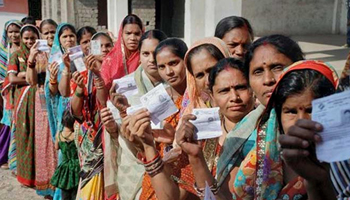
The three Lok Sabha bypolls are in Gujarat's Vadodara, Uttar Pradesh's Mainpuri and Telangana's Medak while 11 assembly constituencies are in Uttar Pradesh, nine in Gujarat, four in Rajasthan, two in West Bengal, five in Assam, Tripura and Sikkim and one each in Chhattisgarh and Andhra Pradesh.
Analysts are looking to see which way the wind blows in the bypolls spread across these nine states.
The results of two Lok Sabha seats — Vadodara which was vacated by Prime Minister Narendra Modi and Medak in Telangana was vacated by Telangana Rashtra Samithi chief and chief minister K Chandrashekhar Rao — are unlikely to throw any surprises. But Samajwadi Party chief Mulayam Singh Yadav’s prestige is at stake in his home turf Mainpuri, the third Lok Sabha seat.
The by-polls are being seen as an indicator of the popularity of the Bharatiya Janata Party (BJP) and opposition parties ahead of four assembly elections likely by the end of the year.
They also pose a key question on the future of the Samajwadi Party (SP) and Bahujan Samaj Party (BSP) in Uttar Pradesh.
The BJP swept to power on the back of a so-called Modi wave this summer, but failed to maintain the momentum in last month’s by-elections in four states where it lost a majority of seats to the Congress party and its allies.
The BJP and its allies together won only eight of the 18 seats that went to the polls while the Congress and its allies won 10.
In the last Lok Sabha polls, a large number of OBCs and Dalits rallied behind the BJP across the Hindi belt. The shift dented the SP and BSP’s support base in the largest electoral state. The SP won just seven seats while Mayawati’s BSP drew a blank.
The grand alliance of the RJD-JDU-Congress could halt the BJP’s charge into this caste base. In the absence of such an alliance in Uttar Pradesh, any further losses may lead to an existential crisis for the two caste-based parties.
If the opposition parties — especially the Samajwadi Party in Uttar Pradesh, the Congress in Rajasthan, Gujarat and Assam — can stop the BJP’s march, their claim about the Modi wave waning will receive a further boost.
With elections in Maharashtra and Haryana due next month, any by-election victory will also give the beleaguered Congress a fresh face saver after its humiliating Lok Sabha defeat.
But it may not be so easy for the opposition. Of the 33 seats, 11 are in Uttar Pradesh where the BJP swept 71 of 80 Lok Sabha seats.
In Gujarat and Rajasthan, where 13 assembly seats are up for grabs, the opposition could not even open its account in the general election.
Three seats are heading for the polls in Congress-ruled Assam where the BJP bagged 50% of Lok Sabha constituencies.
In West Bengal, the ruling Trinamool Congress will be desperate to win both seats as it wants to show that the Saradha scam has not hurt the party’s prospects.
For the BJP, a win or even a number two position in the results from Assam and Bengal will further cement its position as a fast emerging force, replacing traditional opposition parties like AGP and Left, respectively.
The by-elections in Chhattisgarh, Sikkim, Andhra and Tripura will test if the ruling parties can further consolidate their positions. Tripura is the only state where the Left is in power.





Comments
Add new comment